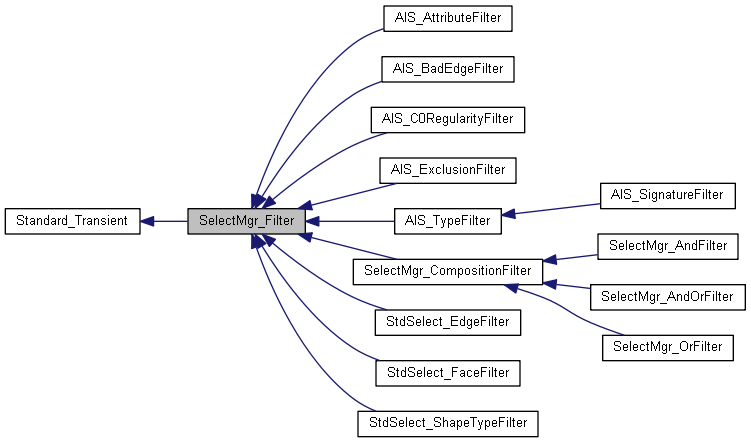The root class to define filter objects for selection. Advance handling of objects requires the services of filters. These only allow dynamic detection and selection of objects which correspond to the criteria defined in each. Eight standard filters inheriting SelectMgr_Filter are defined in Open CASCADE. You can create your own filters by defining new filter classes inheriting this framework. You use these filters by loading them into an AIS interactive context. More...
#include <SelectMgr_Filter.hxx>

Public Member Functions | |
| virtual Standard_Boolean | IsOk (const Handle< SelectMgr_EntityOwner > &anObj) const =0 |
| Indicates that the selected Interactive Object passes the filter. The owner, anObj, can be either direct or user. A direct owner is the corresponding construction element, whereas a user is the compound shape of which the entity forms a part. When an object is detected by the mouse - in AIS, this is done through a context selector - its owner is passed to the filter as an argument. If the object returns Standard_True, it is kept; if not, it is rejected. If you are creating a filter class inheriting this framework, and the daughter class is to be used in an AIS local context, you will need to implement the virtual function ActsOn. | |
| virtual Standard_Boolean | ActsOn (const TopAbs_ShapeEnum aStandardMode) const |
| Returns true in an AIS local context, if this filter operates on a type of subshape defined in a filter class inheriting this framework. This function completes IsOk in an AIS local context. | |
 Public Member Functions inherited from Standard_Transient Public Member Functions inherited from Standard_Transient | |
| Standard_Transient () | |
| Empty constructor. | |
| Standard_Transient (const Standard_Transient &) | |
| Copy constructor – does nothing. | |
| Standard_Transient & | operator= (const Standard_Transient &) |
| Assignment operator, needed to avoid copying reference counter. | |
| virtual | ~Standard_Transient () |
| Destructor must be virtual. | |
| virtual const opencascade::handle< Standard_Type > & | DynamicType () const |
| Returns a type descriptor about this object. | |
| Standard_Boolean | IsInstance (const opencascade::handle< Standard_Type > &theType) const |
| Returns a true value if this is an instance of Type. | |
| Standard_Boolean | IsInstance (const Standard_CString theTypeName) const |
| Returns a true value if this is an instance of TypeName. | |
| Standard_Boolean | IsKind (const opencascade::handle< Standard_Type > &theType) const |
| Returns true if this is an instance of Type or an instance of any class that inherits from Type. Note that multiple inheritance is not supported by OCCT RTTI mechanism. | |
| Standard_Boolean | IsKind (const Standard_CString theTypeName) const |
| Returns true if this is an instance of TypeName or an instance of any class that inherits from TypeName. Note that multiple inheritance is not supported by OCCT RTTI mechanism. | |
| Standard_Transient * | This () const |
| Returns non-const pointer to this object (like const_cast). For protection against creating handle to objects allocated in stack or call from constructor, it will raise exception Standard_ProgramError if reference counter is zero. | |
| Standard_Integer | GetRefCount () const noexcept |
| Get the reference counter of this object. | |
| void | IncrementRefCounter () noexcept |
| Increments the reference counter of this object. | |
| Standard_Integer | DecrementRefCounter () noexcept |
| Decrements the reference counter of this object; returns the decremented value. | |
| virtual void | Delete () const |
| Memory deallocator for transient classes. | |
Additional Inherited Members | |
| typedef void | base_type |
| Returns a type descriptor about this object. | |
| static constexpr const char * | get_type_name () |
| Returns a type descriptor about this object. | |
| static const opencascade::handle< Standard_Type > & | get_type_descriptor () |
| Returns type descriptor of Standard_Transient class. | |
The root class to define filter objects for selection. Advance handling of objects requires the services of filters. These only allow dynamic detection and selection of objects which correspond to the criteria defined in each. Eight standard filters inheriting SelectMgr_Filter are defined in Open CASCADE. You can create your own filters by defining new filter classes inheriting this framework. You use these filters by loading them into an AIS interactive context.
|
virtual |
Returns true in an AIS local context, if this filter operates on a type of subshape defined in a filter class inheriting this framework. This function completes IsOk in an AIS local context.
Reimplemented in AIS_BadEdgeFilter, AIS_C0RegularityFilter, SelectMgr_CompositionFilter, StdSelect_EdgeFilter, StdSelect_FaceFilter, and StdSelect_ShapeTypeFilter.
|
pure virtual |
Indicates that the selected Interactive Object passes the filter. The owner, anObj, can be either direct or user. A direct owner is the corresponding construction element, whereas a user is the compound shape of which the entity forms a part. When an object is detected by the mouse - in AIS, this is done through a context selector - its owner is passed to the filter as an argument. If the object returns Standard_True, it is kept; if not, it is rejected. If you are creating a filter class inheriting this framework, and the daughter class is to be used in an AIS local context, you will need to implement the virtual function ActsOn.
Implemented in AIS_AttributeFilter, AIS_BadEdgeFilter, AIS_C0RegularityFilter, AIS_ExclusionFilter, AIS_SignatureFilter, AIS_TypeFilter, SelectMgr_AndFilter, SelectMgr_AndOrFilter, SelectMgr_OrFilter, StdSelect_EdgeFilter, StdSelect_FaceFilter, and StdSelect_ShapeTypeFilter.